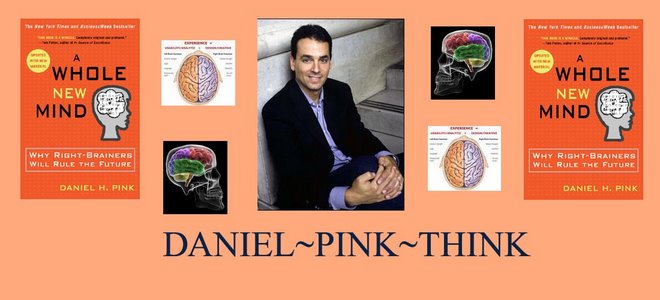Recap of the second iRead meeting
on Daniel Pink’s book, A Whole New Mind,
Chapter One: “Right Brain Rising”
Dr. Mike Thweatt, Professor of Psychology here at Cumberland, led the discussion on Chapter One, “Right Brain Rising.” He reviewed brain research which to some extent supports the premise of the book. However, he questioned why the author chose the subtitle: “Why Right-Brainers will Rule the Future,” as the book promotes the development of the whole mind. Dr. Thweatt also examined the popular myth that we only use 10% of our brain. This is not true! We use 100% of our brain. A different question to ask is do we use only 10% of our mind!
Research on lateralization of the brain indicates the brain’s capacity to integrate the abilities of the two halves. People who have lost a limb experience “phantom limb” whereby the brain will not accept a lack of input from the missing sensors and adapts by taking the input from somewhere else, frequently on the face.
Research has also been done on the isolation of the brain hemispheres. In one experiment a group of people with left brain damage, (aphasics with language problems), were compared to “normal” group of people in their ability to tell whether or not a person was telling the truth. The “normal” group was able to distinguish this 50% of the time, and the left brain damaged group was able to distinguish the truth 60% of the time. This was attributed to their ability to pick up on emotional nuances rather than judging by speech.
Experiment with people with right brain damage shows they can not pick up on nuances or detect sarcasm. Dr. Thweatt also noted that there have been surgical operations to spilt brain abilities which have been effective in the treatment of epilepsy to help the two sides of the brain better communicate.
Other cutting edge research indicates that the brain exhibits plasticity. In circumstances where the vestibular sense is destroyed, the brain no longer receives input from the inner ear which limits an individual’s sense of balance. Researchers have developed a devise that reroutes this input through a sensor on the tongue. The brain eventually adapts to the point where the sensor is no longer needed. Another experiment involved hand maps by sticking micropes in monkey brains. When the mapped fingers were bound or amputated, but the brain adapted quickly. Monks can change their brains through meditation. Intensive and regular practice can change the brain. An experiment with chess masters and cab drivers also reveal pattern recognition.
The ability to see things holistically, seeing the big picture is Gestalt psychology which does not see the brain broken into pieces, but working together.
Research on lateralization of the brain indicates the brain’s capacity to integrate the abilities of the two halves. People who have lost a limb experience “phantom limb” whereby the brain will not accept a lack of input from the missing sensors and adapts by taking the input from somewhere else, frequently on the face.
Research has also been done on the isolation of the brain hemispheres. In one experiment a group of people with left brain damage, (aphasics with language problems), were compared to “normal” group of people in their ability to tell whether or not a person was telling the truth. The “normal” group was able to distinguish this 50% of the time, and the left brain damaged group was able to distinguish the truth 60% of the time. This was attributed to their ability to pick up on emotional nuances rather than judging by speech.
Experiment with people with right brain damage shows they can not pick up on nuances or detect sarcasm. Dr. Thweatt also noted that there have been surgical operations to spilt brain abilities which have been effective in the treatment of epilepsy to help the two sides of the brain better communicate.
Other cutting edge research indicates that the brain exhibits plasticity. In circumstances where the vestibular sense is destroyed, the brain no longer receives input from the inner ear which limits an individual’s sense of balance. Researchers have developed a devise that reroutes this input through a sensor on the tongue. The brain eventually adapts to the point where the sensor is no longer needed. Another experiment involved hand maps by sticking micropes in monkey brains. When the mapped fingers were bound or amputated, but the brain adapted quickly. Monks can change their brains through meditation. Intensive and regular practice can change the brain. An experiment with chess masters and cab drivers also reveal pattern recognition.
The ability to see things holistically, seeing the big picture is Gestalt psychology which does not see the brain broken into pieces, but working together.




No comments:
Post a Comment